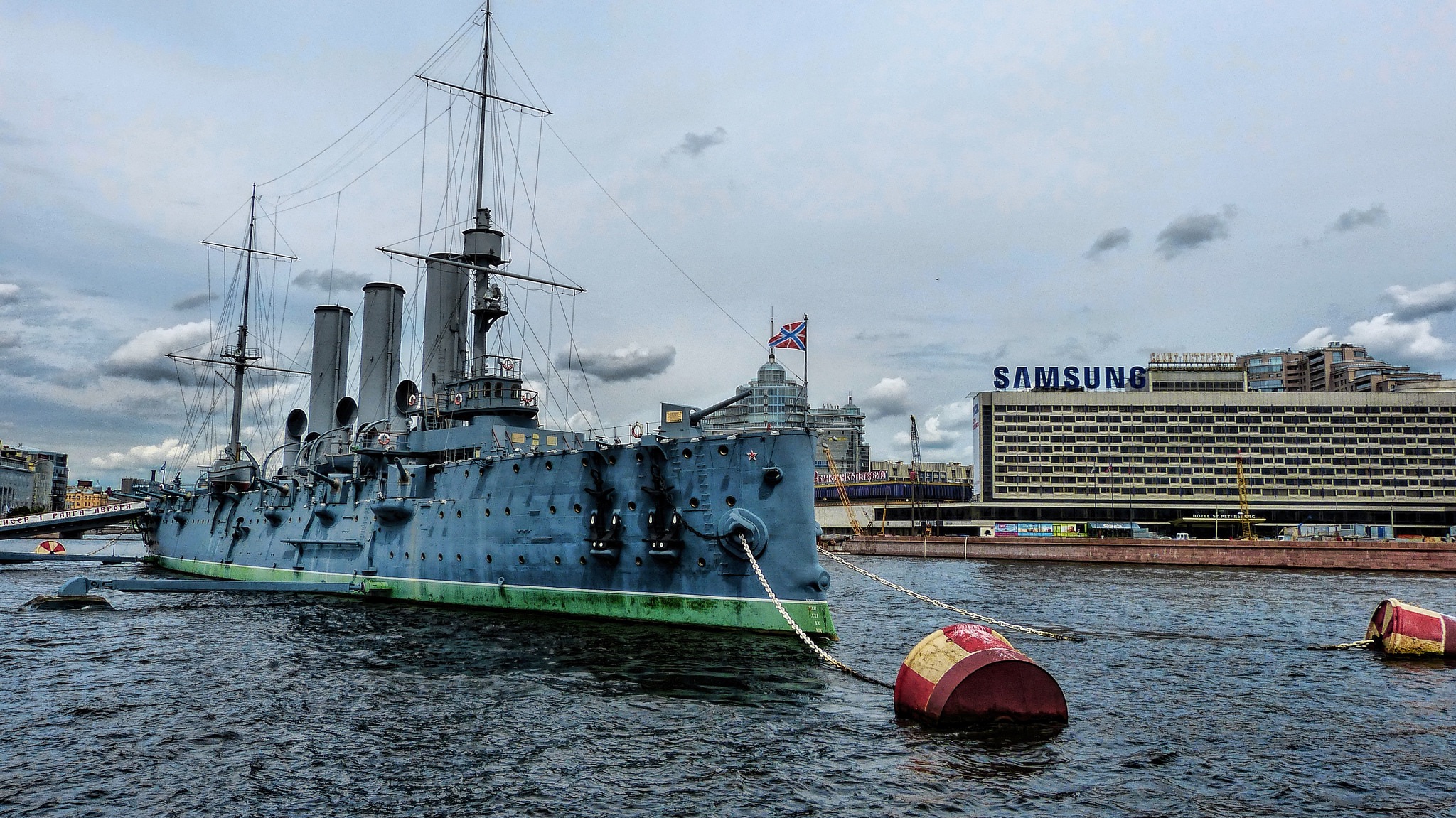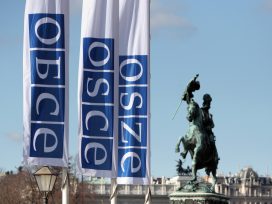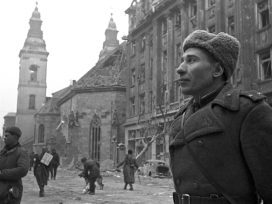Daniel Gascón: You have described the Russian Revolution as the biggest experiment in social engineering in history, and have also argued that it was the weakness of Russia’s democratic culture that enabled Bolshevism to take root. How do you link the two?
Orlando Figes: You could say that the Utopian nature of the revolution developed out of the idea of Russia being a tabula rasa, a blank canvas onto which revolutionaries could project their utopian ideals of human transformation. That was part of a tradition in Russian revolutionary thinking – not just for the Bolsheviks and anarchists, but more importantly for populists in the 19th century, who thought that because Russia was not developed, in a western sense, with political institutions, civil society, an advanced economy, it could sort of ‘leap over’ the West by becoming a new form of democracy or socialism. That idea is in Alexander Herzen’s writing in the 1860s. And part of that utopian thinking that gets superimposed onto Russia in the 19th century and into the 20th century is also the religious aspect, the idea that Russia had some sort of messianic mission in the world, a mission to save humanity.
That sense of Russia having a redemptive, universal role to save the ‘fallen’ West, links through into communism. You could say that there is a straight line that goes from Moscow as the ‘Third Rome’ – the idea of Moscow as the true seat of Christianity – to Moscow as the seat of the Third International: the idea that Russia’s going to save the world through communism.
Before the revolution, you suggest, attempts at reform were part of the country entering the 20th century, but that the dynasty was trying to go back to the 17th century.
The problem of Russia before 1917 is that it’s a very dynamic society, it’s changing very fast: industry is developing, new social classes are coming into being, and there is a great deal of social mobility; there is openness to Europe, with new influences coming along with new social and political demands. But at the same time, tsarism has a very outdated ideology, a sort of fossilized system, and Tsars Alexander III and Nicholas II, in particular, saw it as their duty not to give in to public opinion. This means that they react to those dynamic forces with reactionary politics and turn to ideologies like ancient tsardom and the sacred link between tsar and people. This was absolutely the worst response to the challenge of the 20th century.
You also look at the role of the intelligentsia, who adopt some particularly dogmatic ideas, and the situation for the peasants, whose living conditions you describe in graphic detail.
That’s the core of the problem for any modern democratic movement [in Russia]: that the intelligentsia, who are bound to be the leaders of any democratic, and in particular revolutionary, movement have their own idea of political progress which is taken completely from the West. But imposing western constitutional practices and western ideas on the situation that Russia had [in 1917] is not going to work. Because there is this great gulf between the intelligentsia and the peasants – who are not backward idiots; they simply have a very different concept of social justice, and it’s incompatible with the propertied system. So you have this paradoxical situation in which ultra-democrat landowners – Tolstoy, Herzen and others – know, deep down, that there is this gulf between them and the peasants, and that the ideas of western democracy are not the solution to that gulf – or they could be, but you would need a long period of social progress and the relief of poverty for it to work; much longer than the tsarist regime belatedly allowed, under Stolypin, for example
Then in 1917, that is starkly illuminated by the fact that the men who take over in February are very much committed to the idea of imposing a western, French Revolution-type model on Russia: a constituent assembly, universal suffrage, political liberties, etc. It still doesn’t resolve the basic issue, which is the land question, and also the nationalities problem. So they have no answers to that, really, or are not able to take the imaginative leaps needed to improvise a new type of democracy. I think they could have done, but it would have required them to come to the situation without these ideas of western constitutionalism, and that’s asking too much of people in that situation.
What could an alternative outcome have looked like?
What happened very quickly in 1917 was the development of committee power, so the development of local, direct democracy in terms of local committees, soldiers’ committees and, of course, the Soviets. And I think that those institutions need not have become the instruments of class war, which is what the Bolsheviks used them for, or encouraged them to do. You could have had, as some in the Bolshevik Party, in the Left-Menshevik wings, were thinking, a combination of local soviet-style structures with a national parliament. If Lenin hadn’t come to power, maybe that could have happened: we don’t know, but that could have been a model of democracy that might have held more possibilities for resolving the fundamental problems of Russia without going to dictatorship at one extreme or a military regime with imposed democratic ideas at the other.
There were significant differences between those revolutionaries who had been abroad, and had some exposure to foreign ideas, and those who stayed, fighting and hiding, in Russia. Do these explain some of the tensions in the revolutionary movement?
Certainly, there is a big difference between what one might call the internationalists in the party who saw the revolution in a global context and understood the importance of international support and keeping Russia open and keeping the revolution international, and those home-grown elements of the party that had never been abroad and came on the whole from humbler origins and were brought into the party through the revolution and civil war, who had much more one-nation, one-state view of the revolution, and obviously were the main force of Stalin’s ‘second revolution’ during the period of the first five-year plan.
So they are two fundamentally different elements of the party, who carry with them different views of what the revolution is. This doesn’t explain it all: by 1918, it’s a rather small proportion of the party that has spent years in Europe. But that element of what we might call the Old Bolshevik internationalist view of the revolution is becoming less and less – it’s certainly all destroyed by 1937.

The Russian cruise Aurora, moored in St Petersburg. A blank shot from one of her guns signalled the start of the assault on the Winter Palace in October 1917. Photo: Mariano Mantel. Source: Flickr
You identify the paradox of a proletarian revolution in a peasant country. Were the Bolsheviks aware of this paradox?
According to orthodox Marxist ideology, you can’t have a socialist revolution in a peasant country. So the revolution was premature and was bound to end in dictatorship and terror, unless it got support internationally from more advanced industrial powers. That’s the standard view – but Lenin isn’t a standard Marxist, and from 1905 he sees the possibility of what he calls a proletarian revolution in a big peasant country, providing you neutralise the peasants. That’s what he learned from [the failed uprising of] 1905, and I think that’s precisely why the Leninist view of revolution becomes such an influential model for 20th century revolutions in the third world; that if you’re China, you can have a proletarian revolution based on peasants.
But at the same time, the nature of the Bolshevik movement was that it implied a cultural revolution, because it meant peasants leaving the land and coming into mines, factories, cities; sometimes sending money home, sometimes returning to home to help bring in the harvest but at the same time buying into an idea of modernisation – hyper-modernisation, really; that the answer to Russia’s backwardness and poverty was to sweep away the old peasant world. That’s the example that Bolshevism, as a kind of cultural revolution, held out to those people: they could see a parallel between their own progression from village to city, through school to industry – ‘I am not a peasant, I am a proletarian, I am educated, I am a politically conscious person’ – as an individual trajectory they could see mapped in the national trajectory from peasant society to modern industrial society.
You’ve commented on how, in 1905 and 1917, the revolutionaries were thinking of the revolutions of the 19th century, but how 1917 then became the model for the revolutions of the 20th century.
Revolutionaries are always looking back to the example of other revolutions. So Lenin and all the Bolsheviks – and Mensheviks – they are all looking at the history of the Jacobins, at the history of 1848 and, above all, at the history of the Paris Commune. Revolution is, by its nature, an improvisation – there are no rules – so they are desperately looking for examples from previous revolutions of what will happen, and of what it is to be a revolutionary. Once they have achieved what they see, and the socialist world sees, as a successful revolution – the only successful revolution, one could say, between 1917 and… well 1949, really – then the Bolshevik revolution becomes a model for revolution. And I think it has remained a model for revolutionaries: for instance, the Islamic Revolution [of 1979, in Iran], does have some elements of revolutionary strategy – civil war and terror – taken from Lenin.
Some of the problems you talked about earlier – the land problem, the nationalities problem – were not resolved and could be seen in the break-up of the Soviet Union.
Russia now is finding it very hard to learn how to become a federal nation, and well may break up as a federal nation. It’s a post-imperial state now, and has real problems coming to terms with that status. Many Russian nationalists, and the Russian government, it seems, still seem to think they should be able to say what happens in Ukraine and Crimea. The Russian Empire went through a crisis in 1917 and after, and then was cobbled together through the Soviet system and held together in that way, creating something new to some extent. Soviet identity is not completely a chimera – it did exist and it did manage to find some mechanisms to bind people of different nationalities together – but there is no doubt that it was a sort of empire as well, and was held together coercively, and that as soon as it became possible, states like Georgia and Ukraine wanted out.
As a nation, Russians are the last victims of their own revolution. It’s very difficult for Russia to become a nation, because it has this imperial legacy and because it was the ‘Russian’ Revolution – so they can’t[, like other post-Soviet nations], blame ‘the Russians’ for their revolution. That’s why, I think, the centenary is going to be so quiet: it’s not a history that the Russians can use to go anywhere; it doesn’t have any positive uses for them. In Latvia they can celebrate liberation, in Ukraine they can celebrate independence; but in Russia it’s very hard to do that. So in that sense, the legacies go on but the people really paying for it now are the Russians, rather than anyone else who will hopefully remain outside of Russian control.
So does the way in which Russia evaluates and commemorates the revolution represent a test of its democracy?
Absolutely. The very low-key commemoration that seems to be taking place suggests it’s too divisive, it’s not a history they can use and haven’t come to terms with at all. To become a democracy as a society, to be more questioning of the state and its use of violence – in Crimea, for example – you would have to have a sense of what is politically legitimate. But what to do if your state is founded on the violence of a revolution? In a sense, that is still the case with Russia today, because what happened in 1991 was just collapse; there wasn’t any democratic revolution to create a new state. All that happened was that the Soviet state collapsed and new political elites, largely made up of the old ones, found themselves back in power. Putin’s state is still essentially the inheritor of the Soviet state, in every aspect – in its attitude to power, in its attitude to the country – and that means that many of the old reflex-attitudes of Russians – the unquestioning acceptance of authority, the acceptance of the need for the state to use violence, the protective role of the Cheka/KGB/FSB – are all still there. For Russia to become a democracy will not really happen until Russians begin properly to reconsider what the revolution meant in terms of its legacies, in terms of those deep cultural aspects of thinking. And I don’t see that happening.







